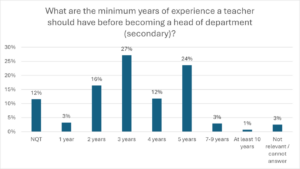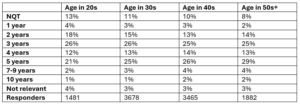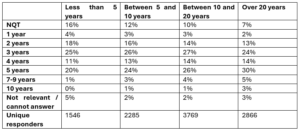It has been a while since I have contributed to my doctoral blog. As I have just registered into Year 5 completing my EdD at Strathclyde University, I thought it would be a suitable time to write down some of my current musings.
A few weeks ago, Teacher Tapp asked a question of its App users that was particularly relevant to my research – What are the minimum years of experience a teacher should have before becoming a head of department (secondary) or head of key stage (primary)?
This falls nicely with my current EdD title – What elements of a new middle leader’s career journey support them to feel prepared for formal leadership roles in Scottish secondary schools? A reminder of some of my background –
My story
I am a Scottish Secondary school teacher of over 10 years having spent nearly 5 years as a departmental and faculty lead in three different schools. I spent substantial portions of my undergraduate degree underperforming academically and getting passes by the skin of my teeth. When given the option on my PGDE year to enter assignments at Masters level, I declined the option, saying that I would never do any more formal education once I completed it.
I continued to hone my craft as a teacher (I am no way finished!) and started to gain leadership experience at a departmental level and was successful at interview to cover a maternity cover as a department head. After a fantastic time in a great department, I realised that I needed and wanted a deeper theoretical understanding to support my career journey. It had begun to niggle at me that I did not go for that Masters credit during my PGDE. When I returned to my substantive post, I applied to do my Masters in Educational Leadership at Strathclyde University thinking that I could get that done before going for a full time PT post. At the same time, I did think it wise to strike whilst the iron was hot and applied for a few PT jobs that were being advertised thinking it was worth a shot.
To my surprise, I was successful at both so in August 2017, I set off on an adventure both as a new Principal Teacher and as a Masters student. I had THE best time engaging with research, conversations with some of Strathclyde’s finest academics but also my fellow students. However, I was riddled with imposter syndrome and always felt I did not have the academic or literacy skills needed to succeed. After a lot of hard work and dedication, I graduated with Merit with a Masters in Educational Leadership.
Why am I telling you this?
I am indulging you in a little of my story as it is important to the current leg of my professional journey and the doctoral research that I am currently engaging in.
As part of my doctoral studies, I completed a systematic literature review entitled “What elements of professional learning impact the leadership development of middle and senior leaders in schools in Scotland? A systematic review of the literature.” where I engaged in Scottish research in the past ten years with a focus on leadership development and preparation for middle and senior leadership.
It will be no great surprise at the five key themes which permeated these nine articles:
- Collaboration and Relationships (8 articles)
- Formal Programmes (8 articles)
- Reflection (5 articles)
- Coaching and Mentoring (3 articles)
- Practitioner Enquiry (3 articles)
Although there are links between the themes above, there were also limiting factors mentioned which hinder development. These were time, trust, and the needs of individual development versus the needs of the system.
However, many of the articles merely mention these as themes for professional development and do not go into detail regarding their effectiveness. This is the area that I wish to explore.
The convergence of my research and my story
Having secured a permanent middle leadership position within the first four years after my probation, I have always been anxious regarding my own ability to be both a great classroom teacher at the same time as a great departmental or faculty lead.
It leads me, amongst other things, to ask:
Should I have spent longer honing my craft as a classroom teacher?
Teacher Tapp Research
This is where the data that Teacher Tapp sent me looking at the opinions of teachers around the country really caught my interest. A reminder of their question – What are the minimum years of experience a teacher should have before becoming a head of department (secondary) or head of key stage (primary)? 10,512 respondents were recorded for this question and the overall results for all sectors looked like the following:

Figure 1 – all respondents (Data: Teacher Tapp)
I have found this particularly interesting as it was around the three-year mark that I took on my first ever acting role. This seems to be the most popular closely followed by 5 years. However, a significant question that I would like some thought on – why is there a dip for 4 years? Is it seen as 3 years, and if not, 5 years seems like a nice number to use?
Primary vs Secondary
When broken down by sector, the following graphs are produced:

Figure 2 – Primary respondents (Data: Teacher Tapp)

Figure 3 – Secondary respondents (Data: Teacher Tapp)
Upon glancing, there does not seem to be much difference. This surprised me as I, ignorantly, thought that the Primary data would be different given, what I presume, is a hugely different job to my own secondary role. If anything, there is small evidence to suggest that Primary practitioners feel you should be waiting a little longer before engaging in your first role as a missile leader.
Age and Experience
The wonders of Teacher Tapp (and I am not on commission I promise!), is the breakdown of the data that can be provided and is often on their blog (Articles – Teacher Tapp). They ask a wide variety of the teaching population.
When you look at the data again but categorised into the ages of respondents:
Table 1 – Age of respondents (Data: Teacher Tapp)

What can be seen here, in my opinion, is a youthful optimism that they would be able to cope with the role earlier in their careers. Those in their 40s and 50s (with more experience – more on that in Table 2) warn against going for middle leadership too soon in their careers.
Age is not always a marker for experience. There are some teachers who have spent time in industry, another profession and come to teaching later in their career. To that end, it is worth looking at the number of years’ experience that respondents had. This is shown in Table 2.
Table 2 – Experience of respondents (Data: Teacher Tapp)

Again, the same warning seems to exist. More experienced teachers warn against going too soon into middle leadership. They may have “been around the block” and therefore warn against moving too soon into middle leadership.
Is this right though? Or have they just witnessed a few bad experiences?
When is the right time to move into middle leadership?
What can you do to prepare yourself, or what do you need to avoid holding you back!
My EdD research
My research aims to address a gap in knowledge in the Scottish context around the perceptions of new middle leaders in Scotland’s secondary schools and their preparedness for their first middle leadership role. I wish to investigate what activities and support that made leaders feel prepared and their views on what they might have done to feel more prepared. I appreciate that this takes away from colleagues out with Scottish Secondary schools but there is always a gap for another researcher to fill!
The study uses narrative inquiry to highlight the stories of middle leaders and the variety of perspectives that might emerge regarding preparation for leadership, promotion, and the confidence of leaders in carrying out their duties.
Participants have been asked to reflect on their careers to date and to articulate the preparedness they feel for taking on a middle leadership role in a Scottish secondary school. Participants will be offered the chance to consider their thoughts and feelings before an interview takes place, the interview then providing an opportunity for participants to retell their stories talking about the impact that events and experiences have had on their journeys.
I have completed the first interviews with my participants and, without giving anything away, I have been amazed by their personal experiences within education and outside of their careers. They have been honest and candid about how prepared they feel they were and what they have done in their careers that feel make them the middle leader that they are. The next job is to finish coding the interviews for common themes and important points. Then, after a collaborative analysis discussion (more on that in a future blog post), it will be time to write it all up. I will be unable to make generalisations due to a small sample size but I will be able to give a snap shop of eight new middle leaders in Scotland, what they feel their role is in middle leadership, and what has prepared them (or not prepared them) for a job in middle leadership in a Scottish Secondary school.
If anyone would like to more, please get in touch at kenneth.drummond@strath.ac.uk or on X @MrDrummond521
 My name is Kenny, and I am a Scottish Secondary school teacher of over 10 years having spent nearly 5 years as a departmental and faculty lead in 3 different schools.
My name is Kenny, and I am a Scottish Secondary school teacher of over 10 years having spent nearly 5 years as a departmental and faculty lead in 3 different schools.
 I haven’t updated my blog since April and a lot has happened since then both in my doctoral studies, my work life and my personal life so I thought this would be a perfect time for an update and let you know what’s been going on and what are the plans for moving forward in my research!
I haven’t updated my blog since April and a lot has happened since then both in my doctoral studies, my work life and my personal life so I thought this would be a perfect time for an update and let you know what’s been going on and what are the plans for moving forward in my research! That last tip is what I am going to use this page for from now on. Even if no one reads it, this will be a place to provide an update on what I have been reading, how it is changing my thinking and, perhaps most importantly, why it is important to my research.
That last tip is what I am going to use this page for from now on. Even if no one reads it, this will be a place to provide an update on what I have been reading, how it is changing my thinking and, perhaps most importantly, why it is important to my research.

 So I had done it! Thrown myself in at the deep end and off I went to the first session of my Strathclyde Doctorate – MELS – Methods of Enquiry, Literature and Scholarship.
So I had done it! Thrown myself in at the deep end and off I went to the first session of my Strathclyde Doctorate – MELS – Methods of Enquiry, Literature and Scholarship.
